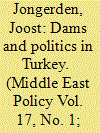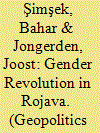| Srl | Item |
| 1 |
ID:
095609


|
|
|
| 2 |
ID:
183471


|
|
|
|
|
| Summary/Abstract |
Kurdish women fighters of the Women’s Protection Unit, YPJ (Yekîneyên Parastine Jin) received considerable attention in Western Europe and the United States. They made the headlines of mainstream newspapers and magazines. The emergence of an all-women, secular military force in the Middle East initiated a multi-layered process of conditional recognition of the Kurdish struggle – a ‘recognition’ in the sense of wide media coverage, but ‘conditional’ since it sought to divorce the feminist approach from its very specific political narrative and then reconnect it with Western liberalism. This paper critically delves into questions of a gendered geopolitics that portrays the Kurdish (feminist) struggle in the US popular discourses while silencing the voices of women and ignoring its historical roots and development. Based on an analysis of articles published in The Washington Post, New York Times, and Newsweek about the struggle for Kobane, we discuss the ways in which geopolitics, Orientalism and gender are interrelated in reports about this struggle. One of our main conclusions is that not despite, but rather through, the portrayal of Kurdish women fighters as heroines–even as angels–the idea of the Middle East was reproduced as a geography of fear, backwardness, and violence. The images of Kurdish women fighters may have superficially appeared to suggest a recognition of their struggle, this is a recognition that works through the presentation of images (portrait) at the expense of silencing the voices of the actors engaged in a struggle for a project that envisages a non-statist democracy. Although the portrayal of this struggle in Western media, in which the image of struggling women is disconnected from their politics, does not contribute to a recognition of their struggle, the women’s enunciation of their struggle in historical and political terms pushes the door for the audibility of Kurdish women’s voices.
|
|
|
|
|
|
|
|
|
|
|
|
|
|
|
|